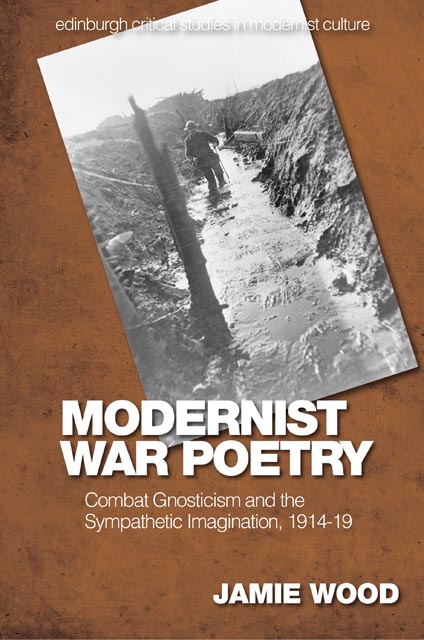Book contents
- Frontmatter
- Contents
- Timelines
- Acknowledgements
- Series Editors’ Preface
- Introduction
- 1 Early Modernist Responses to Combatant Poetry: 1914–Spring 1915
- 2 Reassessing Disaster: 1915
- 3 The Three Lives of Gnosticism: 1916–Summer 1917
- 4 An Emergent Critique of War Experience: Autumn 1917–Spring 1919
- 5 The Form and Practice of Modernist Distaste: Summer–Autumn 1919
- Conclusion
- Bibliography
- Index
3 - The Three Lives of Gnosticism: 1916–Summer 1917
Published online by Cambridge University Press: 13 April 2023
- Frontmatter
- Contents
- Timelines
- Acknowledgements
- Series Editors’ Preface
- Introduction
- 1 Early Modernist Responses to Combatant Poetry: 1914–Spring 1915
- 2 Reassessing Disaster: 1915
- 3 The Three Lives of Gnosticism: 1916–Summer 1917
- 4 An Emergent Critique of War Experience: Autumn 1917–Spring 1919
- 5 The Form and Practice of Modernist Distaste: Summer–Autumn 1919
- Conclusion
- Bibliography
- Index
Summary
Combat Gnosticism: Henri Barbusse, C. R. W. Nevinson, Isaac Rosenberg
In Kangaroo (1923) D. H. Lawrence perfectly captured the changing mood as the appalling events of 1915 gave way to the widespread recognition of an unfolding disaster:
It was in 1915 the old world ended. In the winter of 1915–1916 the spirit of the old London collapsed, the city, in some way, perished, perished from being a heart of the world, and became a vortex of broken passions, lusts, hopes, fears, and horrors. The integrity of London collapsed, and the genuine debasement began, the unspeakable baseness of the press and the public voice[.]
Lawrence had in mind quite specific personal circumstances in these lines: the ongoing suppression of his work, his eventual retreat to Cornwall and fear of conscription. The image still suggests a more generalised emptiness, a cultural vacuum at the eye of the storm. T. S. Eliot and Ezra Pound would fill the space created by war. Eliot finished his delayed postgraduate dissertation in April 1916 and, after the publication of work on Gottfried Leibniz in October, his focus turned to literature with the first in a series of lectureships. Henri Gaudier-Brzeska was dead. Henry James died in February 1916. Ford Madox Ford was on the Somme by the summer of that year, Richard Aldington with the Expeditionary Force by December. Both T. E. Hulme and Wyndham Lewis either returned from or began military training in March 1916 and they both embarked for France in May. By the summer of 1917, the stage was clear for Eliot and Pound to work through what was common and different in their approaches. In a much later essay of 1932, Pound termed the resulting period a ‘“movement to which no name has ever been given”’. Pound soon became Foreign Editor at the Little Review and Eliot the Assistant Editor at The Egoist. Together they held the means to write the blank agenda left by the vortex. Unlike their conscripted European peers, until well into 1918 they sat beyond the coercive reach of their own governments.
The English public first heard the distraught voice of the moral witness in the summer of 1916. We need to be precise in the dating of this event. As the first evidence take Henri Barbusse’s Le Feu, the novel Jay Winter identifies as the seminal account of moral witnessing in modernity.
- Type
- Chapter
- Information
- Modernist War PoetryCombat Gnosticism and the Sympathetic Imagination, 1914-19, pp. 90 - 134Publisher: Edinburgh University PressPrint publication year: 2022



